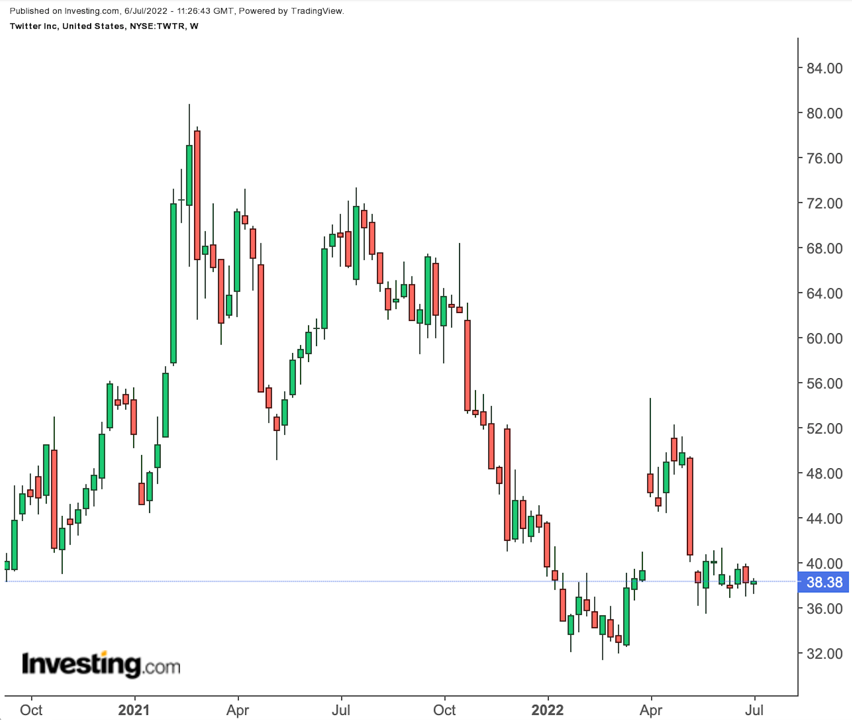This article was written exclusively for Investing.com
It seems hard to believe, but it was less than three months ago that Elon Musk announced his offer to acquire Twitter (NYSE:TWTR). A week and a half later, the social media company agreed to sell itself to the Tesla (NASDAQ:TSLA) chief executive officer for $54.20 per share.

On Apr. 25, the day the deal was announced, TWTR stock last traded at $51.70. It closed Tuesday at $38.38—26% lower.
The decline is due to one simple fact: the market doesn't actually believe Elon Musk is going to wind up owning Twitter. More accurately, the market doesn't believe Musk will wind up owning TWTR at a price of $54.20 per share.
The question is why the market believes that—and if that belief is correct. If it isn't, there's good money to be made in TWTR stock below $40.
An Airtight Acquisition
The most obvious reason to believe that Musk won't pay $54.20 per share is that, almost since the agreement was announced, the Tesla CEO seemingly has been trying to back out of the deal.
Twitter and Musk announced the agreement on Apr. 25. Two days later, Musk criticized Twitter executives, seemingly violating a non-disparagement clause in the agreement.
On May 13, Musk said the sale was “temporarily on hold” because of bots on the Twitter platform. But as former securities lawyer Matt Levine rightly pointed out, “temporarily on hold” is “not a thing.” The bot issue didn't, and doesn't, rise to the standard of a “material adverse effect” that would allow Musk to back out of the transaction.
In early June, Musk threatened to walk away if he didn't receive data on the number of fake accounts. Two days later, Twitter complied.
Legally speaking, there's no reason to believe that Musk has an out from this deal. The narrative that he can simply pay $1 billion and move on has little basis in fact; Musk signed an agreement and barring a massive change, that agreement is binding.
Indeed, in mid-June, Musk attended a meeting of Twitter employees in which he detailed his plans for the company. One would think that attendance, and those words, on their own strongly suggest that Musk believes he will wind up in charge of Twitter.
Even Odds
Any expert legal analysis (and, to be clear, I'm working off other sources here) seems to suggest that Musk is bound by his agreement. But the market is acting as if he isn't. The spread between the TWTR stock price has widened markedly. At the Apr. 25 close, TWTR traded at a 4.8% discount to the offer price. The figure now is 29.2%.
The expanding spread in turn suggests sharply lower odds of the deal closing at $54.20. Given a reasonably quick time to closing, in late April, the market was pricing in likely 90%-plus odds of a deal. By mid-May, after the stock had retreated to about where it trades now, I argued the implied odds were lower than 50%.
At the moment, the implied odds no doubt are higher, even though TWTR stock hasn't really moved since I made that estimate. The reason is that the potential downside in TWTR has expanded. Indeed, that's part of why Musk no doubt wouldn't mind exiting, or at least re-pricing, the acquisition.
It was on Apr. 14 that Musk made his offer of $54.20 per share. Since then, other social media stocks have sold off. Pinterest (NYSE:PINS) is down 18%, Meta Platforms (NASDAQ:META) 25%, and Snap (NYSE:SNAP) an ugly 62%.
So, had Musk not made his offer, TWTR stock likely has sold off rather steeply, particularly given a soft first quarter earnings report.
If Musk could somehow walk away, it's not difficult to imagine TWTR dropping to the low $20s. That price would still value the company at roughly 3x revenue, despite the fact that user growth has stalled out and the company has never posted consistent profits excluding stock-based compensation. If the upside is $54 and the downside, say, $24, a price around $39 would suggest roughly even odds of the deal closing.
Can Musk Re-Price The Deal?
Of course, that's only true ignoring the third option: that Musk is able to re-price the acquisition. Twitter's board continues to hold firm, certainly. But even if the agreement is airtight from a legal perspective, Musk has the time and money to force Twitter to take him to court in a process that would certainly take months, and potentially take years.
Meanwhile, that decline in social media stocks and the soft Q1 report, both weaken Twitter's position somewhat. Twitter may choose to accept the certainty of a revised offer rather than the risk of losing in court and seeing its business decline, creating even more downside than there might be now.
That seems to be the outcome that investors are pricing in: that the Twitter board accedes to the realities of the legal system and the current stock market, and gives Musk a discount.
But it does seem like investors are being too cautious. The reputation of Twitter—not known as the best-managed company out there, and one with astonishingly low share ownership at the board level—and Musk, who famously said he was taking Tesla private in 2018, no doubt are factors.
Yet, again, there's a signed legal agreement here. The odds of Musk actually walking away don't seem particularly high. The odds of Twitter accepting an offer below $38—where Musk himself was buying stock in April—seem rather low.
Something like $44.20 a share (bowing to Musk's love of a '420' joke) does seem possible—but still offers double-digit upside.
Trades like this, known as merger arbitrage, can be dangerous. The downside in TWTR might be higher than the upside.
But, overall, it does seem like the market is presuming that the odds of something going very wrong are much higher than they actually are. The most likely outcome is that Elon Musk indeed acquires Twitter. In that outcome, investors who buy TWTR at $38 should do well—and possibly quite well.
Disclaimer: Vince Martin has no positions in any securities mentioned. He may initiate a position in TWTR stock or options in the near future.
***
Looking to get up to speed on your next idea? With InvestingPro+, you can find:
- Any company’s financials for the last 10 years
- Financial health scores for profitability, growth, and more
- A fair value calculated from dozens of financial models
- Quick comparison to the company’s peers
- Fundamental and performance charts
And a lot more. Get all the key data fast, so you can make an informed decision, with InvestingPro+. Learn More »
